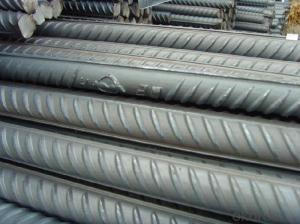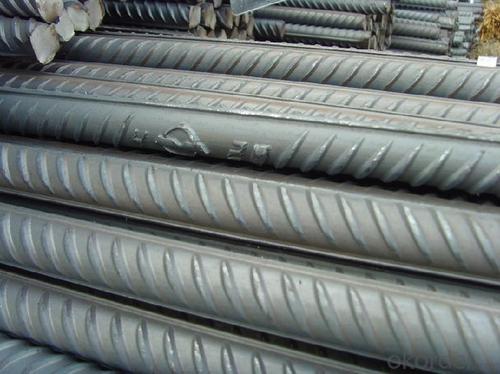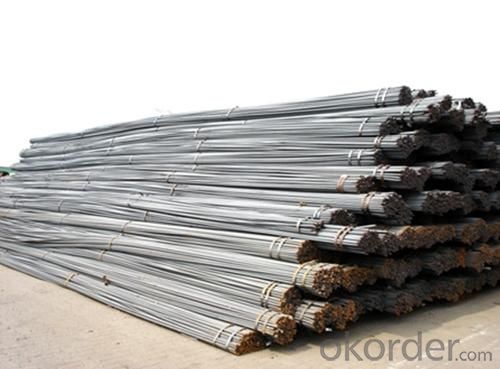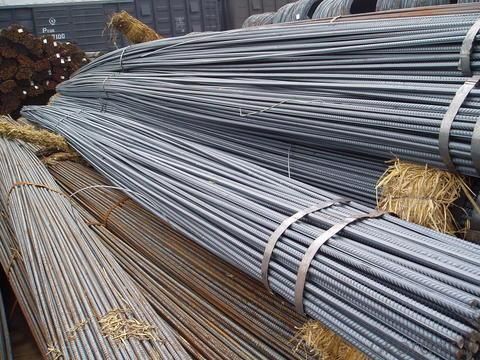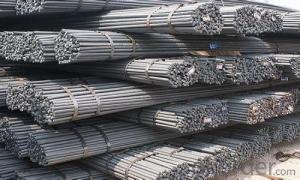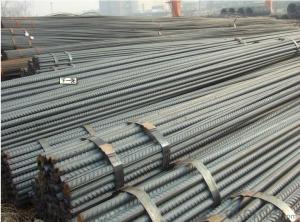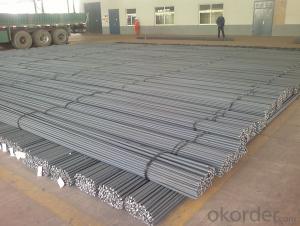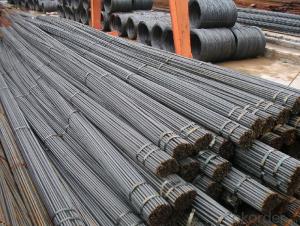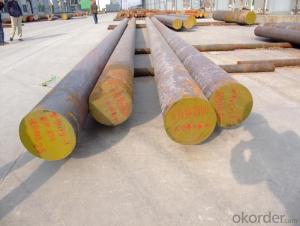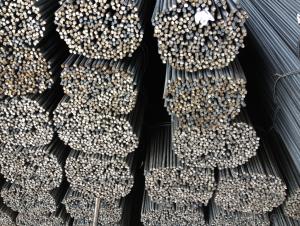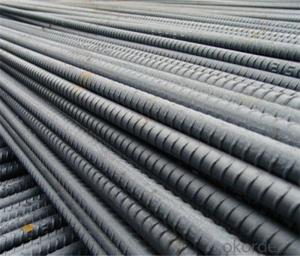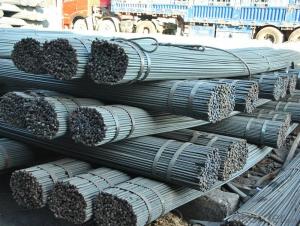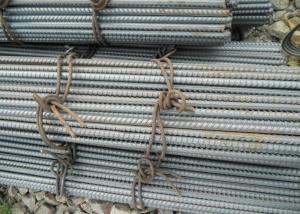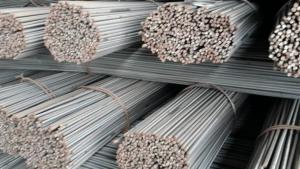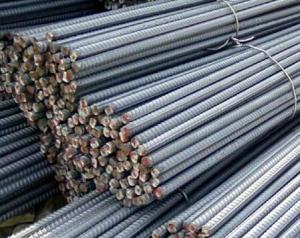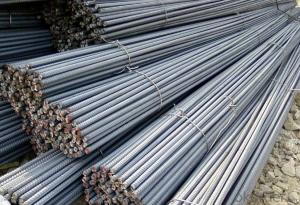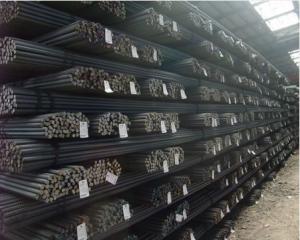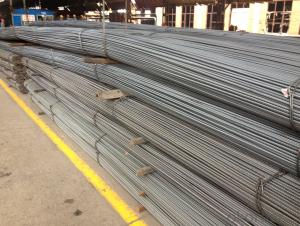Deformed Steel Bar, Iron Rods for Construction or Concrete
- Loading Port:
- Tianjin
- Payment Terms:
- TT or LC
- Min Order Qty:
- 25 m.t.
- Supply Capability:
- 35000 m.t./month
OKorder Service Pledge
OKorder Financial Service
You Might Also Like
Product Description:
OKorder is offering Deformed Steel Bar, Iron Rods for Construction or Concrete at great prices with worldwide shipping. Our supplier is a world-class manufacturer of steel, with our products utilized the world over. OKorder annually supplies products to European, North American and Asian markets. We provide quotations within 24 hours of receiving an inquiry and guarantee competitive prices.
Product Applications:
Deformed Steel Bar, Iron Rods for Construction or Concrete are ideal for structural applications and are widely used in the construction of buildings and bridges, and the manufacturing, petrochemical, and transportation industries.
Product Advantages:
OKorder's Deformed Steel Bar, Iron Rods for Construction or Concrete are durable, strong, and resist corrosion.
Main Product Features:
· Premium quality
· Prompt delivery & seaworthy packing (30 days after receiving deposit)
· Corrosion resistance
· Can be recycled and reused
· Mill test certification
· Professional Service
· Competitive pricing
Product Specifications:
Certificates: CE & ISO9001:2000
Material: hrhrb400 ,hrb500, BS4449, ASTM A615, SD400
length:6-12
Size: 6mm-40mm
HRB 400E Hot rolled steel rebar
Type | steel rebar |
Standard Grade | a. GB1499.2-2007, HRB335, HRB400E, etc. |
b. ASTM A615 Gr.40, Gr.60, etc. | |
c. BS4449/1997, etc. | |
Diameter | 6mm-32mm etc. |
Length | 6m, 8m, 9m,12m as standard |
Application | construction industry with all types of reinforced concrete structures and so on |
Packing | standard export packing, or as per customers' requirement |
Quality | First quality |
Delivery time | Right now after the deposit. |
Others | 1. all the production process are made under the ISO 9001:2001 strictly |
2. our products conform to all the standards | |
3. we can offer special specification products as per our customers | |
FAQ:
Q1: Why buy Materials & Equipment from OKorder.com?
A1: All products offered byOKorder.com are carefully selected from China's most reliable manufacturing enterprises. Through its ISO certifications, OKorder.com adheres to the highest standards and a commitment to supply chain safety and customer satisfaction.
Q2: How do we guarantee the quality of our products?
A2: We have established an advanced quality management system which conducts strict quality tests at every step, from raw materials to the final product. At the same time, we provide extensive follow-up service assurances as required.
Q3: How soon can we receive the product after purchase?
A3: Within three days of placing an order, we will begin production. The specific shipping date is dependent upon international and government factors, but is typically 7 to 10 workdays.
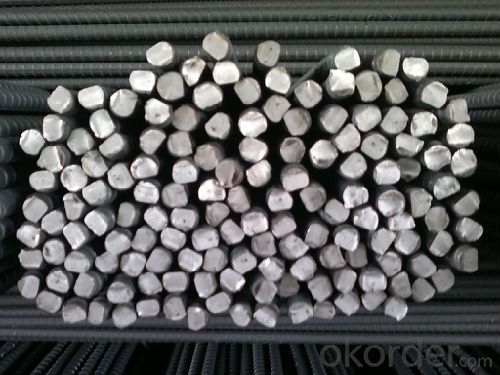
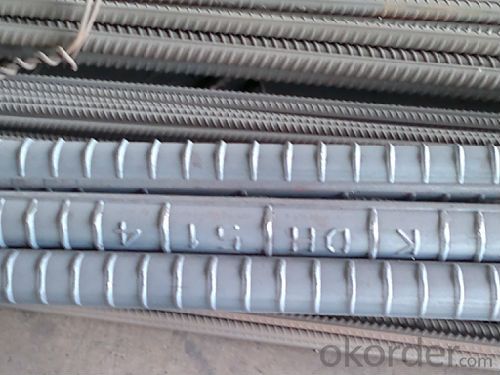
- Q: What is the role of steel rebars in roof slab construction?
- Steel rebars play a crucial role in roof slab construction by providing strength, durability, and reinforcement to the structure. They are used to reinforce the concrete and enhance its load-bearing capacity, allowing the roof slab to withstand external forces such as live loads, dead loads, and wind loads. The rebars are strategically placed within the roof slab to create a mesh-like structure, forming a strong bond with the concrete. This reinforcement prevents the concrete from cracking or breaking under heavy loads, ensuring the structural integrity of the roof slab. Additionally, steel rebars help to distribute the load evenly, minimizing the risk of localized stress concentration. By adding steel rebars to the roof slab, it becomes capable of resisting tensile forces, which concrete alone is unable to handle effectively. This is important as roofs are subjected to various forces such as wind uplift and expansion and contraction due to temperature changes. The rebars act as a backbone, absorbing and distributing these forces throughout the slab, preventing any potential structural failures. Moreover, steel rebars also provide resistance against deformations caused by shrinkage and thermal expansion of the concrete. These factors can lead to cracks and instability in the roof slab, but the presence of rebars helps to control and limit such deformations, maintaining the overall stability of the structure. In summary, the role of steel rebars in roof slab construction is to provide reinforcement, strength, and durability to the concrete. They enhance the load-bearing capacity, resist tensile forces, distribute loads evenly, and prevent cracking or breaking, ensuring the long-term structural integrity and stability of the roof slab.
- Q: Can steel rebars be used in structures with high chloride ion concentration?
- Steel rebars should generally not be used in structures with high chloride ion concentration, as the presence of chloride ions can lead to corrosion of the steel. Chloride ions can penetrate the concrete and come into contact with the steel reinforcement, causing it to corrode and weaken over time. This corrosion can eventually lead to structural failure and compromise the safety and integrity of the structure. To mitigate the risk of corrosion in high chloride ion environments, alternative materials such as stainless steel rebars or fiber-reinforced polymers (FRP) can be used. Stainless steel rebars are more resistant to corrosion compared to regular steel rebars due to their higher chromium content. FRP rebars, on the other hand, are non-metallic and do not corrode, making them a suitable option for structures exposed to high chloride ion concentrations. It is important to consider the specific environment and exposure conditions when selecting the appropriate material for reinforcement in structures. Consulting with a structural engineer and following relevant building codes and standards can help ensure the use of suitable materials and prevent potential corrosion issues in high chloride ion environments.
- Q: How are steel rebars classified based on their surface patterns?
- Steel rebars are classified based on their surface patterns into two main categories: plain rebars and deformed rebars. Plain rebars have a smooth and plain surface without any surface patterns or deformations. They are primarily used in applications where the concrete needs to slide along the rebar, such as in bridges and highway pavements. Plain rebars provide a high level of bonding between the steel and concrete due to the smooth surface, ensuring good load transfer between the two materials. On the other hand, deformed rebars have surface patterns or deformations that enhance their bonding with concrete. These patterns can be in the form of ribs, indentations, or other irregularities. Deformed rebars provide better mechanical anchoring to the concrete, preventing slippage and improving the overall structural integrity of reinforced concrete structures. Deformed rebars are further classified based on the type and shape of their surface patterns. Some common types include: 1. Ribbed rebar: These rebars have continuous, evenly spaced ribs along their entire length. The ribs provide increased bonding strength with the concrete, ensuring the rebar stays in place even under heavy loads. 2. Indented rebar: These rebars have indentations or impressions along their length. The indentations increase the surface area of the rebar, enhancing the bond between the steel and concrete. 3. Twisted rebar: These rebars have a twisted pattern along their length. The twisted pattern provides additional mechanical interlocking between the rebar and concrete. The choice of rebar surface pattern depends on the specific requirements of the construction project. Factors such as the type of structure, load-bearing capacity, and local building regulations play a crucial role in determining the appropriate classification of steel rebars based on their surface patterns.
- Q: What is the difference between hot-rolled and cold-worked steel rebars?
- The main difference between hot-rolled and cold-worked steel rebars lies in the manufacturing process. Hot-rolled steel rebars are produced by heating the steel billets to high temperatures and then passing them through rolling mills to create the desired shape and size. This process results in a rougher surface and higher yield strength compared to cold-worked steel rebars. On the other hand, cold-worked steel rebars are made by subjecting the hot-rolled steel bars to additional processing steps, such as cold drawing or cold rolling. This process enhances the mechanical properties of the steel, including improved tensile strength, dimensional accuracy, and a smoother surface finish. In summary, hot-rolled steel rebars are formed through high-temperature rolling, while cold-worked steel rebars undergo additional steps to further refine their properties, resulting in a smoother surface and improved mechanical strength.
- Q: What is the minimum cover required for steel rebars in concrete structures?
- The minimum cover required for steel rebars in concrete structures typically depends on the specific design requirements and local building codes. However, a commonly accepted guideline is to have a minimum cover of at least 1.5 inches (or 40 millimeters) for rebars in reinforced concrete structures. This cover helps protect the steel reinforcement from corrosion, fire, and other potential hazards, ensuring the durability and strength of the concrete structure.
- Q: Are steel rebars suitable for reinforcement in airport runways?
- Yes, steel rebars are suitable for reinforcement in airport runways. They provide excellent strength, durability, and resistance to heavy loads and impacts, making them an ideal choice for ensuring the structural integrity and safety of airport runways.
- Q: How are steel rebars anchored into existing concrete?
- Steel rebars are commonly used to reinforce existing concrete structures. The process of anchoring steel rebars into existing concrete involves several steps. First, the concrete surface needs to be prepared. This typically involves cleaning the area where the rebar will be anchored to remove any dirt, debris, or loose concrete. The surface may also need to be roughened to provide better adhesion. Once the surface is prepared, a bonding agent such as epoxy or a cementitious grout is applied. This bonding agent helps to create a strong bond between the rebar and the concrete. Next, the steel rebar is positioned and inserted into the prepared area. The length of the rebar that is inserted into the concrete depends on the required anchorage depth and the design specifications. The rebar should be positioned at the correct depth and aligned according to the structural requirements. To ensure proper anchorage, the rebar is often bent or hooked at the end. This helps to prevent the rebar from pulling out of the concrete under tension or other external forces. Finally, the bonding agent is left to cure according to the manufacturer's instructions. This allows the bonding agent to harden and form a strong bond between the rebar and the concrete. It is important to note that the exact method of anchoring steel rebars into existing concrete may vary depending on the specific application and design requirements. In some cases, additional reinforcement methods such as mechanical anchors or post-installed anchors may be used to enhance the anchorage strength. Professional expertise and adherence to engineering guidelines are crucial to ensure the proper and safe anchoring of steel rebars into existing concrete structures.
- Q: Are steel rebars prone to bending or warping?
- Yes, steel rebars are prone to bending or warping under certain conditions. The flexibility and malleability of steel make it susceptible to bending or warping when subjected to excessive stress, temperature changes, or improper handling during construction or transportation. Proper reinforcement techniques and quality control measures can help minimize the risk of bending or warping in steel rebars.
- Q: How do steel rebars affect the overall stability of a structure?
- Steel rebars, or reinforcing bars, play a crucial role in enhancing the overall stability of a structure. They are primarily used to reinforce concrete structures and increase their strength and durability. The inclusion of steel rebars significantly improves the structural integrity of a building or any other construction. One of the key ways steel rebars affect the overall stability of a structure is by strengthening the concrete against tensile forces. While concrete is excellent at withstanding compressive forces, it is relatively weak in resisting tension. Steel rebars, with their high tensile strength, help counteract this weakness by absorbing and distributing tensile forces throughout the structure. This prevents the concrete from cracking or collapsing under excessive tensile loads, thereby enhancing the stability. Moreover, steel rebars also improve the structural stability by enhancing the flexural strength of a structure. Flexural strength refers to a structure's ability to withstand bending or flexing without deforming or failing. By adding steel rebars to reinforced concrete beams, columns, or slabs, the overall flexural strength of the structure increases significantly. This helps prevent excessive deflection and ensures the structure can bear the loads it is subjected to, such as the weight of the building, live loads, or external forces. Additionally, steel rebars contribute to the stability of a structure by resisting shear forces. Shear forces occur when two parts of a structure slide or move in opposite directions. These forces can cause structural failure if not adequately addressed. Steel rebars, when properly placed and anchored, restrain the concrete from shearing, thus preventing potential collapse or instability. Furthermore, steel rebars also improve the stability of a structure by enhancing resistance to seismic forces. In earthquake-prone areas, the inclusion of steel rebars provides the necessary ductility and energy dissipation capacity to withstand seismic activity. The rebars act as a network of interconnected elements, distributing the seismic forces and ensuring the structure remains stable during an earthquake. In conclusion, steel rebars greatly influence the overall stability of a structure by reinforcing concrete against tensile forces, enhancing flexural strength, resisting shear forces, and improving resistance to seismic activity. Their inclusion significantly increases the strength, durability, and integrity of a construction, ensuring it can withstand various loads, forces, and potential hazards, thereby enhancing the overall stability of the structure.
- Q: Can steel rebars be used in dam construction?
- Yes, steel rebars can be used in dam construction. They are commonly used to reinforce concrete structures, including dams, to enhance their strength and durability.
Send your message to us
Deformed Steel Bar, Iron Rods for Construction or Concrete
- Loading Port:
- Tianjin
- Payment Terms:
- TT or LC
- Min Order Qty:
- 25 m.t.
- Supply Capability:
- 35000 m.t./month
OKorder Service Pledge
OKorder Financial Service
Similar products
Hot products
Hot Searches
Related keywords
